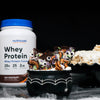Digestive Troubles? Nothing "Beets" Betaine HCL!

Having digestive troubles? As we age, our gut tends to become more sensitive. When you were a teenager, you might have been able to eat an entire pizza without repercussions. Ten years later, that same pizza might leave you feeling bloating and uncomfortable.
Many of the gastrointestinal issues we face are the result of low levels of hydrochloric acid in the stomach. Acid is what breaks down food for digestion, and low levels can lead to improper digestion.
Betaine HCL has emerged as a popular treatment for people looking to improve their stomach acidity and ditch their digestive troubles once and for all. But is betaine HCL right for you?

What Is Betaine HCL?
Betaine HCL is a natural amino acid supplement made by combining betaine with hydrochloric acid (HCL).
Betaine, otherwise known as trimethylglycine, is an amino acid derivative found in foods such as beets, bran, wheat germ, and spinach. Within the body, betaine functions as a methyl donor and plays a significant role in metabolism.
Hydrochloric acid (HCl) is a strong acid naturally produced in the stomach alongside sodium chloride (NaCl) and potassium chloride (KCl). The resulting fluid is highly acidic. When we eat, this fluid digests our food, allowing nutrients to be absorbed into the bloodstream.
Betaine HCL May Aid Digestion
The most common use of betaine HCL supplementation is to treat digestion issues that arise from a lack of acid production in the stomach, also known as hypochlorhydria.
Insufficient stomach acid leads to a rise in the pH level of the stomach, which lead to issues such as indigestion, heartburn, and nutritional deficiencies.
Betaine HCL May Aid Heart Health
Betaine HCL has been shown to be effective at decreasing blood homocysteine in healthy individuals. High levels of homocysteine in the bloodstream can lead to the buildup of plaque in the arteries.
Plaque can cause your arteries to narrow. This results in decreased blood flow to the heart and can cause chest pain, shortness of breath, and other heart complications. If plaque continues to accumulate, it could result in a heart attack.
What Is Pepsin?
If you’re experiencing digestive troubles and are shopping for a betaine HCL supplement, you may have noticed an additional ingredient on the label of many products. Pepsin.
Pepsin is the chief digestive enzyme in the stomach. It digests proteins, breaking them down into amino acids. Pepsin is not necessary for betaine HCL to be effective, but it is certainly helpful.
Is Betaine HCL Right For You?
Betaine HCL is most commonly used to treat a condition called hypochlorhydria. Hypochlorhydria is a condition which results in low levels of hydrochloric acid in the stomach. As we learned earlier in this article, without hydrochloric acid, our stomachs cannot digest food into absorbable nutrients.
Hypochlorhydria may be caused by:
- Age
- Stress
- Acid Reflux Medications
- Bacterial Infection
- Zinc Deficiency
Below, you’ll find a list of symptoms often associated with hypochlorhydria.
- Bloating
- Burping
- Upset stomach
- Nausea
- Undigested food in stool
- Indigestion
You may notice that many of the items on this list are fairly low-intensity. Experiencing any one or even multiple of these at once may not necessarily mean that you have hypochlorhydria. If you suspect that you are suffering from hypochlorhydria, please consult your doctor.
Do not take betaine HCL if:
- You are on anti-inflammatory medication such as aspirin or ibuprofen. Doing so may result in damage to your gastrointestinal lining.
- You are currently pregnant or breastfeeding.
Conclusion
Betaine HCL is a natural supplement which is commonly used to treat digestive issues caused by low levels of stomach acid.
Hypochlorhydria can cause serious damage if left untreated. If you're experiencing digestive troubles, talk with a professional.
Sources
https://www.medicalnewstoday.com/articles/322491#symptoms
https://pubmed.ncbi.nlm.nih.gov/16216219/
https://www.ncbi.nlm.nih.gov/pmc/articles/PMC3946491/
https://pubmed.ncbi.nlm.nih.gov/16510043/
https://www.ncbi.nlm.nih.gov/pmc/articles/PMC3610948/
https://pubmed.ncbi.nlm.nih.gov/15628717/
-
Posted in
Heart Health, Metabolic Support











